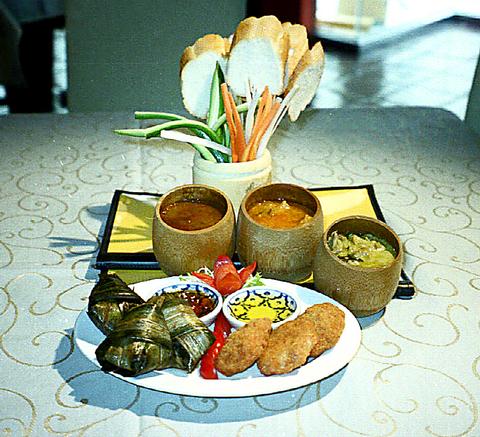While restaurants catering in Thai cuisine, or variations thereof are now scattered the length and breadth of Taipei City, one of the very first joints to bring the spicy tang of Thai food to denizens of the nation's capital recently added even more mouthwatering grub to its already extensive menu.
Part of the Pam Restaurant Group, a restaurant chain that boasts branches in Japan, China, Malaysia, Australia and Hawaii, the Coca has been serving up spicy dishes in Taipei for the past six years. It has become famous for a dish that is very different from the standard Thai fare found at other Southeast Asian restaurants.
Known as Suki Thai and originally the brainchild of Patama Phanphensophan -- a Thai national born in Guangdong Province -- there are now so many variations of the dish available that it requires its own menu.

PHOTO: GAVIN PHIPPS, TAIPEI TIMES
"There are now so many Thai restaurants in Taipei that if you want to stand out you need to offer diners more than the standard fare. And the Suki Thai is such a dish," said Pam Sun (
Based on the Chinese hot pot solely in the sense that diners get to choose their own ingredients and add them to the steaming broth at their leisure, the flavor of Suki Thai is far removed from that of the popular local winter dish.
Offering the choice of a flavorsome chicken or radish-based soup, diners can choose to fill their hot pot with a multitude of fresh ingredients depending on how much they wish to spend.
The all-you-eat option of Suki Thai ranges in price from NT$370 to NT$660. For those who wish to spend that little extra cash, live crab, beef and assorted seafood hot pots are also available from between NT$680 and NT$780. And for that special occasion, a lobster Suki Thai large enough to feed 10 is also on the menu and costs NT$4,800.
While Suki Thai has become the restaurant's trademark dish, the chefs at Coca, all of who hail from sunny Siam, have also concocted several new and exciting flavors of curry, the most original and tasty of which is the Massaman beef curry (NT$320). A mixture of Thai and Indonesian curries with the addition of extra, secret spices, the dish is a minefield of contrasting and tangy flavors.
Not that lovers of simple Thai food should feel left out while dining at Coca. Plenty of Thai favorites are also available and include dishes such as papaya salad (NT$180), steamed sea bass in lime and garlic sauce (NT$460), spicy spare ribs (280), tom yum soup (NT$220) and various red and green curries ranging in price from NT$280 to NT$420.

In the next few months tough decisions will need to be made by the Taiwan People’s Party (TPP) and their pan-blue allies in the Chinese Nationalist Party (KMT). It will reveal just how real their alliance is with actual power at stake. Party founder Ko Wen-je (柯文哲) faced these tough questions, which we explored in part one of this series, “Ko Wen-je, the KMT’s prickly ally,” (Aug. 16, page 12). Ko was open to cooperation, but on his terms. He openly fretted about being “swallowed up” by the KMT, and was keenly aware of the experience of the People’s First Party

Aug. 25 to Aug. 31 Although Mr. Lin (林) had been married to his Japanese wife for a decade, their union was never legally recognized — and even their daughter was officially deemed illegitimate. During the first half of Japanese rule in Taiwan, only marriages between Japanese men and Taiwanese women were valid, unless the Taiwanese husband formally joined a Japanese household. In 1920, Lin took his frustrations directly to the Ministry of Home Affairs: “Since Japan took possession of Taiwan, we have obeyed the government’s directives and committed ourselves to breaking old Qing-era customs. Yet ... our marriages remain unrecognized,

Not long into Mistress Dispeller, a quietly jaw-dropping new documentary from director Elizabeth Lo, the film’s eponymous character lays out her thesis for ridding marriages of troublesome extra lovers. “When someone becomes a mistress,” she says, “it’s because they feel they don’t deserve complete love. She’s the one who needs our help the most.” Wang Zhenxi, a mistress dispeller based in north-central China’s Henan province, is one of a growing number of self-styled professionals who earn a living by intervening in people’s marriages — to “dispel” them of intruders. “I was looking for a love story set in China,” says Lo,

During the Metal Ages, prior to the arrival of the Dutch and Chinese, a great shift took place in indigenous material culture. Glass and agate beads, introduced after 400BC, completely replaced Taiwanese nephrite (jade) as the ornamental materials of choice, anthropologist Liu Jiun-Yu (劉俊昱) of the University of Washington wrote in a 2023 article. He added of the island’s modern indigenous peoples: “They are the descendants of prehistoric Formosans but have no nephrite-using cultures.” Moderns squint at that dynamic era of trade and cultural change through the mutually supporting lenses of later settler-colonialism and imperial power, which treated the indigenous as